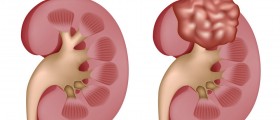
Esophageal cancer a malignant tumor originating from epithelial cells of the esophagus, to be more precise the cells that line the inside of the organ. Even though the cancer may affect any part of the esophagus, it seems to be localized in the lower portion of the organ in the majority of patients. As for genders, the tumor is reported more in men than in women. Also, some countries have higher incidence rate of this tumor. For instance, certain countries in Asia have many cases of this cancer reported each year.
Esophageal Cancer Symptoms and Signs
In people the very presence of the tumor inside the organ leads to swallowing difficulty (dysphagia) and sometimes even choking while eating. As a result one eats less and eventually loses weight. Further grow of the tumor is associated with non-specific chest pain or pressure inside the chest cavity. Sometimes patients report burning sensation in the chest. Fatigue, coughing and hoarseness are symptoms of advanced disease.
If it is in initial stage, esophageal cancer is asymptomatic. Only when the tumor reaches certain size, it may narrow or block the lumen of the organ and compress the surrounding tissues and organs causing a whole range of different symptoms and signs.
Types of Esophageal Cancer
Esophageal cancer can be classified according to the cells the tumor is made of. Adenocarcinoma originates from the cells of mucous-secreting glands of the esophagus. It is located in lower parts of the organ. Squamous cell carcinoma is tumor made of cells that are found on the surface of the inner lining. This type of esophageal tumor is commonly localized in the middle of the organ. This is actually the most commonly reported type of this malignant disease. Apart from the mentioned types of esophageal carcinoma, there are several more which are not so frequently reported. They include choriocarcinoma, lymphoma, melanoma, sarcoma and small cell cancer.
Esophageal Cancer Treatment Options
The type of esophageal tumor, the stage of the disease, patient's general health etc. are all factors which are taken into consideration when choosing treatment for esophageal cancer. The best thing is, however, when the cancer is identified while still in early stages. Then it can be completely surgically removed.
Surgery may only include removal of the tumor. This is performed if esophageal cancer is small and limited to the superficial layer of the organ. In such case apart from the tumor, the surgeon removes a margin of healthy tissue around the tumor this way preventing cancer recurrence. Another surgery is esophagectomy. It includes surgical excision of only one part of the esophagus, the one affected by cancer. This surgery also includes surgical removal of the regional lymph nodes. Sometimes surgeons opt for surgical excision of the esophagus and the upper portion of the stomach and nearby lymph nodes. This is a so-called esophagogastrectomy.
All in all, in spite of surgery the tumor may be quite aggressive and reoccur. The prognosis is good only if esophageal cancer is diagnosed in early stages of the disease.

















Your thoughts on this
Loading...